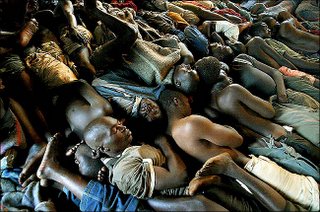Via
Le Colonel ChabertYou know, it's hard to imagine anything worse than coming back to your home in New Orleans and finding it completely destroyed. But, tonight, as you're about to hear, there is something worse, much worse. Dozens of families have returned to what is left of their homes and found, lying amidst the mold and the wreckage, a body, forgotten, abandoned. Maybe it's their mother or their grandmother, sometimes even their missing child.
The state called off searching house to house in New Orleans well over a month ago. They said they completed the job.
SNIP
There was no joy for Paul Murphy (ph) in this homecoming. When he walked into his house in New Orleans' Ninth Ward last month for the first time since Katrina, it was shock and anger.
UNIDENTIFIED MALE: So, I'm thinking that, OK, I was going to come and salvage a few pictures or something. And I walk in here. I found my grandma on the floor dead.
DORNIN: Since November 1, 10 bodies have been found in the ruins of the Ninth Ward. The last area, known as the Lower Ninth, will open to residents December 1. Coroner Frank Minyard worries about what people will find.
(on camera): You're fully expecting that more bodies will come in once they open the Ninth Ward?
FRANK MINYARD, ORLEANS PARISH CORONER: Yes. And I think it's -- it's going to come in for a good while. There's so much rubbish around that they might find people in the rubbish. DORNIN (voice-over): They already have. And there are still many bodies left unidentified and unclaimed.
SNIP
(BEGIN VIDEOTAPE) COOPER: You warned us October 3. When the state stopped house- to-house searching for -- for -- for the deceased, you said, it was a bad idea, that there were more people out there. Now the death toll, it turns out, has jumped by 104. And -- and families are returning to find the bodies of their loved ones still in their homes. How does -- it's got to infuriate you.
JACK STEPHENS, SAINT BERNARD PARISH SHERIFF: Well, you know, you just wonder what provoked that decision.
A month ago, we were still very much in the midst of a -- of a crisis. And the National Guard was conducting the house-to-house searches. And if you go through, Anderson, the neighborhoods right now that were searched then, a lot of them bear the mark of "N.E.," which means no entry.
I was always under the impression that there would be a hard- target search at some point following that to determine whether or not there were any casualties left in those dwellings. As of right now -- in fact, the day before yesterday, in my own jurisdiction, a family came home to discover a family member who had been reported missing.
COOPER: Oh, my God.
STEPHENS: It was a horrible -- it was a gruesome sight. Very -- and again, people don't deserve any more grief and pain than they're going through right now. I mean, this whole process has been so excruciatingly screwed up and slow that, I mean, you're starting to feel a real sense of anger and hostility on the part of people locally and, my God, it's well-deserved. more









